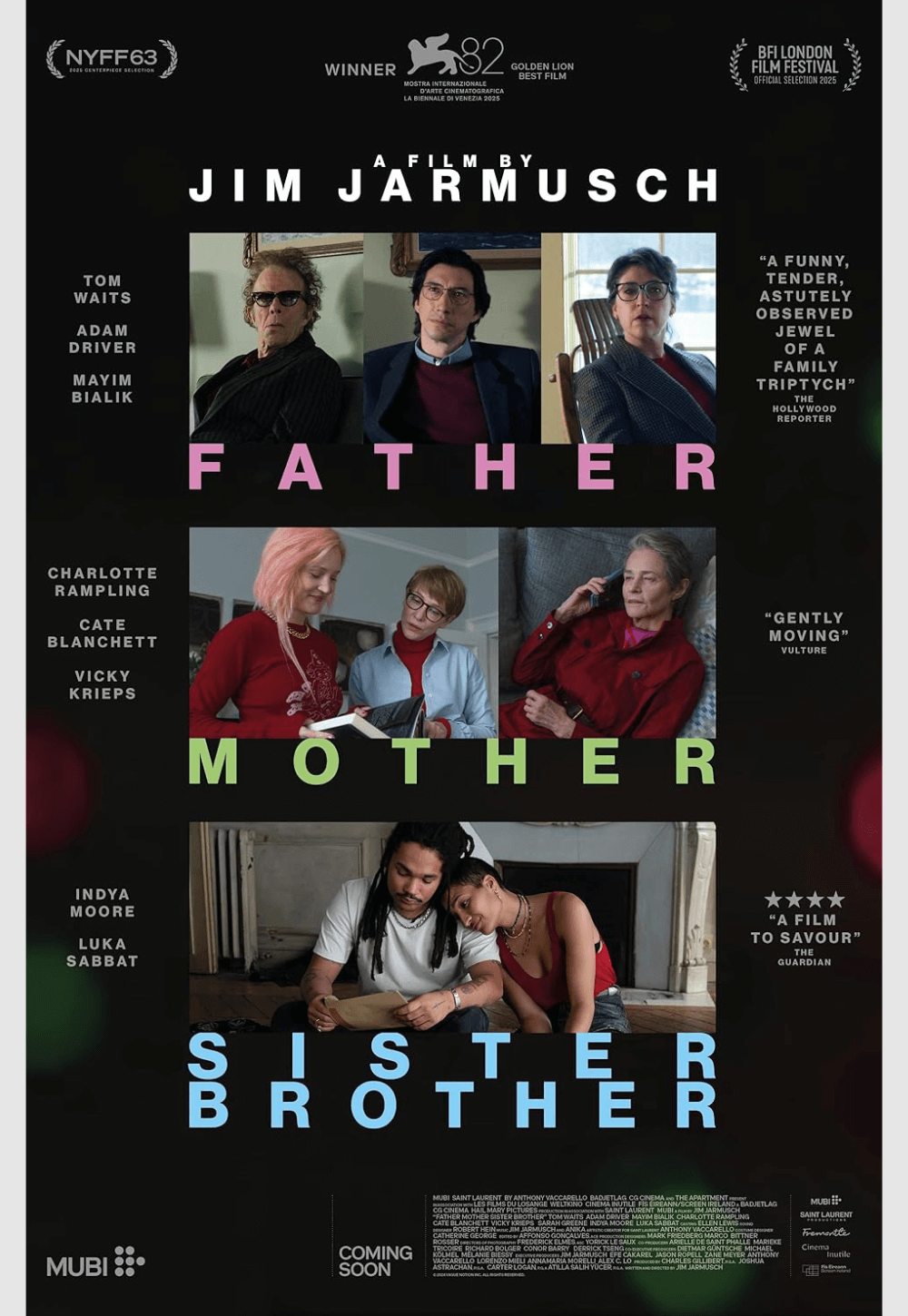
Nightbitch
By Brian Eggert |
Note: This film was screened for the Twin Cities Film Fest and reviewed on October 23, 2024. It will open in theaters via Searchlight Pictures on December 6, 2024.
A parable for the malaise and dimensionality of motherhood, Nightbitch links the metamorphosing effect of raising a child with a body transformation genre movie. Based on Rachel Yoder’s 2021 best-seller, the film’s logline is that a former artist turned stay-at-home mom’s domestic routine evolves when she embraces her inner monster—an inborn creature that manifests as a canine. In keeping with the tale’s metaphoric intent, the characters have generalized names. Amy Adams stars as Mom and looks the part of a fraught suburban homemaker. Having exchanged her reputation in cosmopolitan art circles for motherhood, she feels trapped by her role, and some crucial part of her identity was lost by having a child. Scoot McNairy plays Dad, who spends weekdays traveling for his bring-home-the-bacon job. Arleigh and Emmett Snowden share duties as Baby—the go-to name used by Mom. In a desperate, if unconscious and instinctual, move to reclaim her individual power and sense of self, Mom sprouts a tail, eats raw meat, and runs free at night, hunting for something to bury.
Even with this inspired, Kafkaesque concept, writer-director Marielle Heller doesn’t have much fun, nor does she have any revelatory ideas about motherhood. Distributed by Searchlight Pictures, the film’s advertising has emphasized the gimmick of a werewolf-like transformation into a mythical creature. (If we consider her the Old English equivalent of werewolf, which means male and wolf, then technically, Mom is a wifhund, a combination of wif, meaning female, and hund, meaning dog. But I digress.) Mothers are usually presented as superheroes, not monsters, and they’re either capable of achieving anything or perpetually overtaxed by societal expectations. While readers have praised Yoder’s book for its complex views on motherhood, Heller searches for a more commonplace, audience-friendly solution. Heller’s work is capable and entertaining, just as her last two features, Can You Ever Forgive Me? (2018) and A Beautiful Day in the Neighborhood (2019). But it never confronts the viewer with its ideas nor presents a challenge beyond its quirky conceit.
The film opens with a montage of Mom’s maddeningly dull routine, making pan-fried frozen hashbrown patties and boxed macaroni for Baby, attending “Book Babies” events with him at the local library, and giving him horsey rides. Baby refuses to sleep in his bed at night, so he sleeps with her. With other mothers, she daydreams about saying what she really feels, but instead, she plays the role of a genial parent. Her internal monologue flows in voiceover, but also in scenes where she seems to speak out loud to no one in particular, sometimes literally, sometimes figuratively. Heller alternates between these modes without much rhyme or reason. On one beleaguered night, Baby points out that “Momma fuzzy.” Mom has developed a patch of white fur on the small of her back and a large lump, like a cyst, which she pops to gag-inducing effect. Inside is a tail. Her teeth feel sharper. Her sense of smell heightens. Only when a kindly librarian (Jessica Harper) gives her a copy of A Field Guide to Magical Women—which, after checking, is not a real book, unfortunately—does she realize there’s a whole history of human-animal transformations among women.
Like some werewolf movies going back to The Wolf Man (1941), there’s a question about whether Mom actually transforms or the change occurs in her head. Spending all her time isolated with Baby, Mom cannot get a moment to herself. And Dad isn’t much help. One weekend when he’s home, she tells him, “I don’t want anything else needing me or touching me.” Dad is an “If that’s what you want” kind of husband, seemingly incapable of reading his partner’s body language or expressing curiosity about her inner self. A cliché of the disengaged husband, he would rather play video games than connect. So maybe these maddening surroundings have driven Mom over the edge, prompting a canine hallucination. But this question is far too literal and misses the narrative’s point, which amounts to a fable about the Freudian “return of the repressed.” Only when Mom embraces her animal side—in a corrective measure to reclaim her freedom, individuality, and creativity—can she feel fulfilled as a mother and a person.

Heller directs with an unchallenging pleasantness. Although much of Nightbitch veers into comic territory, I smiled more than laughed. Scenes where Mom decides to overcome Baby’s behavioral issues by treating him like a dog, complete with a collar, dog bowls for mealtime, and a doggie bed, made me chuckle. But much of the film has that mini-major indie quality that’s just a little edgy, but also too palatable, unchallenging, and audience-friendly. Cinematographer Brandon Trost, who shot Heller’s The Diary of a Teenage Girl (2015) and Can You Ever Forgive Me?, doesn’t give the material much visual style, supporting the emotional groundedness of the story over its magical realism. Most of the heavy lifting belongs to the actors. Adams and McNairy both serve their roles well, while Harper is excellent in her few scenes as the wise sage librarian, who laments everything women give up “for the continuation of the species” and might be a shapeshifter, too. But probably not.
Those expecting a B-movie starring an A-lister will be sorely disappointed. This is not a feature that finds Mom transforming and tearing out throats until, in the end, Dad has to put her down. This is a film about mothers finding a balance. However, the advertising and promotional material leans too heavily on the hook, all but setting up the movie to fail with some viewers. Even so, the surface lesson of Nightbitch, that “motherhood is fucking brutal,” feels evident to anyone who’s experienced motherhood or wondered how their mother does it. What’s unique about the story is how it yearns for equilibrium between a mother’s characteristic selflessness and her often-overlooked individuality. It refuses to accept the limited gender and familial roles for women, and instead, it embraces the multifacetedness that traditional roles for women so often curtail.
In that sense, Nightbitch considers the pride, resentment, anger, and love a mother feels—it’s all part of the package. There’s even an animalistic side that might want to run off-leash and chase a rabbit. After all, people are complicated, and mothers are no exception, even though society expects them to be bastions of patience and benevolence. While this message will undoubtedly resonate with many, the material often feels too safe as presented, regardless of Mom’s occasional outbursts (“I can crush a walnut with my vagina,” she declares before racing out of a restaurant, stolen burger in hand). Heller’s non-style is a long way from supporting this tale of feminine rage, muting what another director may have accentuated to the audience’s delight. It’s an arch conceit; perhaps an equally expressive visual style may have enriched the material. So, while its lessons may resonate, Nightbitch underwhelms with its mild, conventional filmmaking and need to be accessible.

Thank You for Supporting Independent Film Criticism
If the work on DFR has added something meaningful to your love of movies, please consider supporting it.
Here are a few ways to show your support: make a one-time donation, join DFR’s Patreon for access to exclusive writing, or show your support in other ways.
Your contribution helps keep this site running independently. However you choose to support the site, please know that it’s appreciated.
Thank you for reading, and for making this work possible.
Brian Eggert | Critic, Founder
Deep Focus Review







